Strategies for Infant and Young Child Feeding in Climate-Related Emergencies
Live event
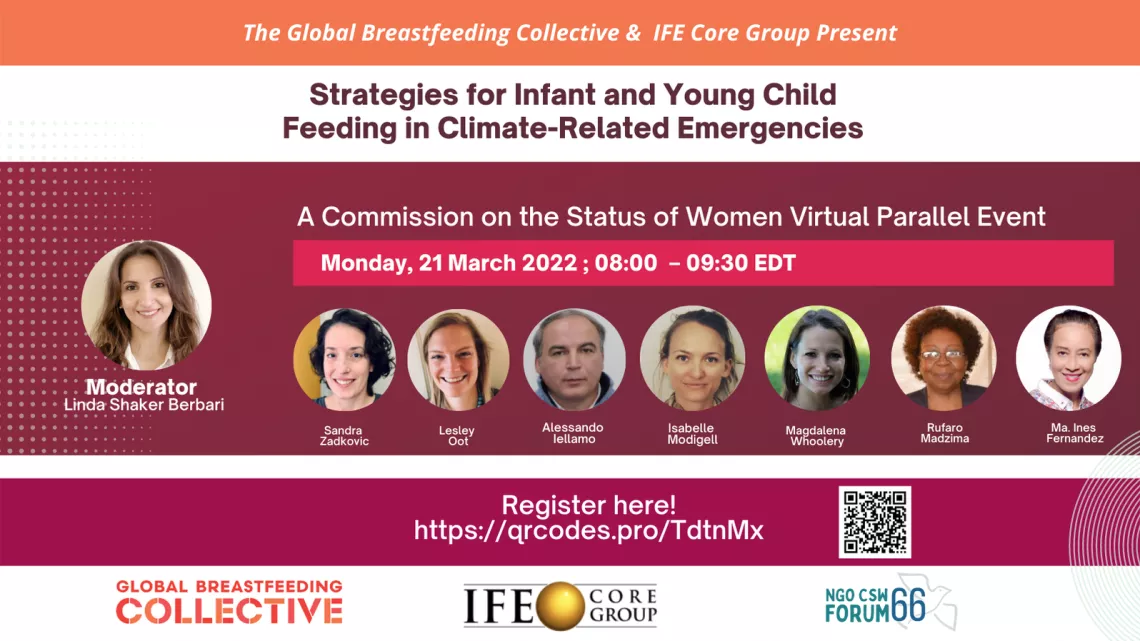
As climate-change related emergencies increase, the need for support for mothers and their young children is greater than ever.
However, common practices in disaster relief and during the COVID-19 pandemic, such as donations of infant formula and cessation of breastfeeding counseling programmes, undermine child survival.
Supporting women by protecting and supporting breastfeeding, starting in pregnancy, and encouraging appropriate complementary feeding are proven strategies for reducing health risks to infants and young children. These strategies can also limit the impact of the rapidly growing formula industry on climate change and the first-food system.
In this session, experts will share:
- Policies that – if implemented and enforced – support women by protecting families from predatory marketing and providing skilled breastfeeding support
- Case studies of disaster preparedness that center on infant feeding safety
- Proven strategies for protecting and supporting maternal, infant, and young child nutrition
Sponsored by the Global Breastfeeding Collective (GBC) with support from the IFE Core Group.
Co-led by UNICEF and the World Health Organization, the Collective is a partnership of 28 prominent international agencies, calling on donors, policymakers, philanthropists and civil society to increase investment in breastfeeding worldwide.
The Infant Feeding in Emergencies (IFE) Core Group is a global collaboration of agencies and individuals that formed in 1999 and is dedicated to ensuring more effective infant and young child feeding support in emergency contexts by strengthening learning; guidance and policies; planning and capacity.
Speakers
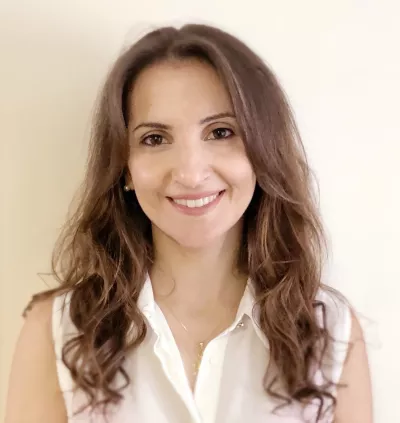
Linda Shaker Berbari, PhD
Linda is an expert in public health and community nutrition with more than 18 years of experience in Lebanon, the Middle East, and beyond. She currently serves as a consultant with the Emergency Nutrition Network as the facilitator of the Infant Feeding in Emergencies Core Group, a global collaboration of agencies committed to infant feeding in emergencies. She has earned her PhD from the University of Dundee – Scotland with a focus on Public Health Nutrition Policy and Infant and Young Child Feeding in Emergencies. She has a Master’s degree in Nutrition and a Bachelor’s degree in Nutrition and Dietetics from the American University of Beirut. She has worked with several agencies and academic institutions throughout the years; engaged in community nutrition program planning, development, monitoring and evaluation as well as policy, strategy development, and research. Her research and work interests include improving the diets of infants and young children, including in emergency situations, and public health nutrition policy.

Sandra Zadkovic
Sandra Zadkovic is a breastfeeding peer support volunteer and enjoys a career in the non-profit sector where she has worked with organizations addressing health, food security, and environmental issues. Her personal breastfeeding experience sparked an interest and passion for protecting breastfeeding rights. As a student in the Ecological Public Health course at the University of Toronto’s Dalla Lana School of Public Health, Sandra explored the historical and ongoing intersections between breastfeeding and climate change, presenting her research in the article “Breastfeeding and Climate Change: Overlapping Vulnerabilities and Integrating Responses” published in the Journal of Human Lactation in April 2020. The goal of her research is to urge health professionals, policy makers, non-profit organizations and breastfeeding advocates everywhere to recognize the shared roots of breastfeeding subversion and work in solidarity with other anti-oppressive movements, including the climate justice movement.
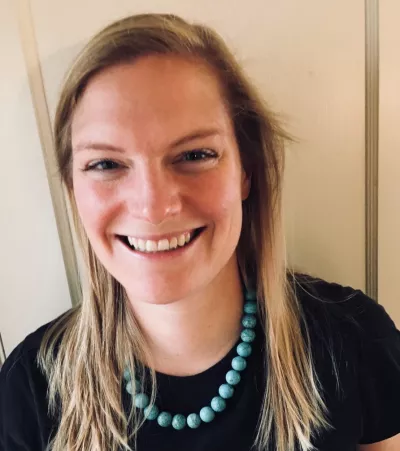
Lesley Oot, MPH
Lesley Oot is a Technical Advisor with the USAID Advancing Nutrition project, USAID’S flagship nutrition project. Prior to this, she worked as an Associate Director on Alive & Thrive, a Bill & Melinda Gates Foundation-funded global nutrition initiative. Ms. Oot is a global health professional with more than 10 years of experience providing programmatic and technical assistance to maternal, infant and young child nutrition programs in Africa and Asia, with a focus on improving women and children’s health and nutrition through advocacy, systems strengthening, and implementation of effective multi-sectoral approaches.

Alessandro Iellamo
Alessandro Iellamo is the senior emergency nutrition adviser for Family Health International 360 (Fhi360) supporting and a maternal, infant, and young child nutrition specialist. He has extensive expertise in nutrition and infant and young child feeding (IYCF) policies and practices, particularly in emergencies, the WHO International Code, BFHI, the Operational Guidance for Infant and Young Child Feeding in Emergencies and other global tools. He has worked with the WHO’s Scientific and Technical Advisory Group (STAG) on the International Code and assisted the International Baby Food Action Network with the development of the World Breastfeeding Trends Initiative (WBTI) and the World Breastfeeding Costing Tool (WBCi) and IYCF policy tools. He has also been involved in research on maternal, IYCF policies, practices, and programmes, including work environments, International Code implementation, and financial aspects of the WHO/UNICEF Global Strategy on IYCF. His expertise in nutrition, emergency nutrition, and IYCF has supported humanitarian work in Africa, the Middle East and South Asia and South-East Asia. He has led the development of recent IYCF-E tools and guidance documents and facilitated international and national policies and guidance development processes. Recently, he has been engaged with IYCF related policy issues in high-income countries including Italy, Australia, and Japan. Alessandro has led the planning, organization and facilitation of webinars and workshops, including the independent dialogue hosted by the Institute for Climate, Energy & Disaster Solutions and the ANU Gender Institute at the Australian National University.

Ma. Ines Av. Fernandez
Ma. Ines Fernandez is a member of the Infant Young Child Feeding (IYCF) Technical Working Group with the Department of Health in the Philippines and serves on the International Baby Foods Action Network Global Coordinating Council (IBFAN G-5). Ines is the co-founder of the Breastfeeding Movement in the Philippines and Arugaan, an NGO meant to nurture fully with a lifetime commitment. She has extensive experience in providing relactation and infant feeding support in the aftermath of disasters. In collaborations with the WHO Western Pacific Regional Office and UNICEF’s Manilla office, Ines has led disaster response efforts to provide infant feeding support to nearly 7,000 mom-baby survivors of the devastating typhoons Yolanda and Ondoy. Her trained Breastfeeding Expert Support Team (BESTeam) have also collaborated with other trained volunteer mother support groups to respond in the aftermath of the Taal Volcano eruption in 2019. In addition, she recently launched a 24/7 Breastfeeding Call Center. Ines formerly served as the Southeast Asia Representative for IBFAN, the WABA co-coordinator for Women and Work Task Force, and as an Ashoka Fellow in 2015.
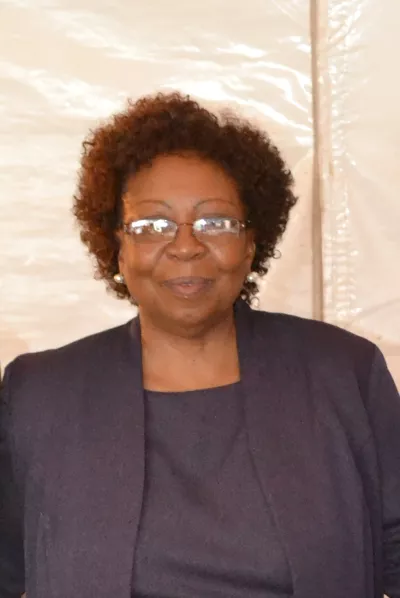
Rufaro Charity Madzima
Rufaro Charity Madzima is an independent consultant in Maternal, Infant and Young Child Nutrition, and an advocate on IYCF issues with over 25 years of experience in food and nutrition with Ministry of Health and Child Care in Zimbabwe and across Africa. She was the National Infant and Young Child Feeding Coordinator including in emergencies from 1993 to 2008 and currently serves as a technical advisor to Nutri@ctive, a local breastfeeding organization. She has been involved with WABA as country contact person, as a member of the International Advisory Council (Zimbabwe) since 2008 and co-coordinator for the WABA Infant Feeding and HIV Taskforce in 2009. Rufaro is an IBFANer, a Wellstart-trained breastfeeding advocate and trainer, an ICDC-trained Code trainer, implementer and monitor. She was the chair person for the IBFAN Africa Advisory Board from 2004 to 2007. In 2014, she directed training of trainers in Baby Friendly in the Context of Emergencies for UNHCR in Ethiopia.
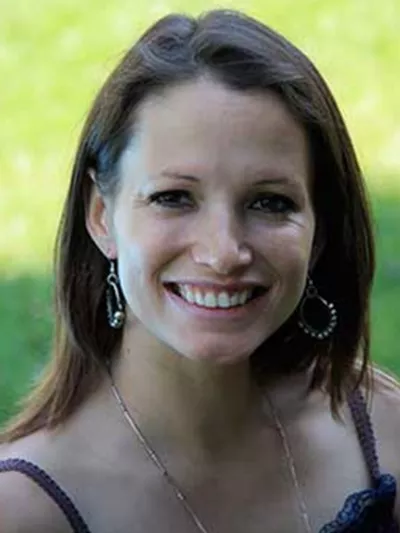
Magdalena Whoolery, PhD
Dr. Magdalena Whoolery is the founder and director of the recently established Breastfeeding International NGO. She is a Maternal Child Health and Infant Young Child Feeding Consultant, with over 20 years of experience as a registered nurse with a PhD from Brunel University, working in health and social sectors. Magdalena has worked for the World Health Organization in Timor-Leste and for UNICEF in Indonesia. During the April 2021 flood response, she developed the first “Nurturing Care Centers of Excellence (NCCE) for Emergencies and Beyond”, a cost-effective and innovative package of care for rapid integration of MCH-IYCF recommended practices. Following the successful pilot of NCCE at an evacuation center, and improved outcomes of maternal, child and infant health and nutrition, the Ministry of Health requested UNICEF support in replicating the program in all 20 evacuation centers. NCCE is now integrated as part of the National Mother Support Group under the Alola Foundation’s directive. Magdalena provides technical support to various stakeholders at government and community levels, in the health sector, and in emergencies to scale up protection, promotion, and support of breastfeeding and skin-to-skin contact.
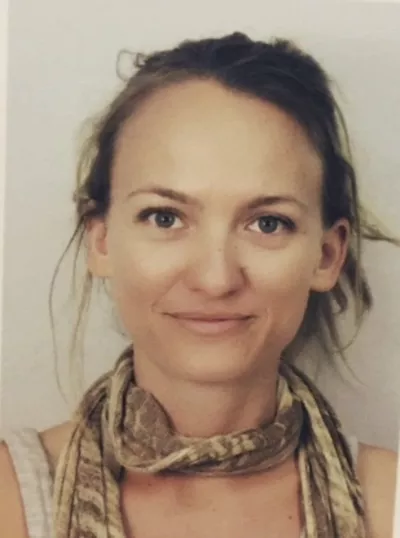
Isabelle Modigell
Isabelle Modigell is the lead author of the Operational Guidance: Breastfeeding Counselling in Emergencies, which she worked on closely with Dr. Linda Shaker Berbari on behalf of the Emergency Nutrition Network (ENN) and the IFE Core Group. She is an Infant and Young Child Feeding in Emergencies (IYCF-E) specialist with a public health background and over nine years of experience working in diverse humanitarian contexts across three continents with several organizations, including Save the Children, ENN, UNICEF, and the GNC Technical Alliance. Following three years of deploying as part of emergency response teams, she became an independent consultant in 2017. Since then, Isabelle has been responsible for the development of National IYCF-E guidelines and conducting various programmatic evaluations and reviews and has been actively involved in IYCF-E capacity building initiatives and the development of global guidance, including the Operational Guidance on Infant Feeding in Emergencies. Isabelle is currently the Global IYCF-E Adviser for Save the Children. She also continues to work in private practice as a breastfeeding counsellor and postpartum doula from her home in Thailand.
KEY RESOURCES
Technical Advice and Support
En-net
A free and open online forum which offers peer-to-peer exchange and “real time” technical advice in response to nutrition questions and operational challenges. https://www.en-net.org
Global Nutrition Cluster Technical Alliance: Technical Support
The GNC Technical Alliance provides technical expertise to improve nutrition outcomes in emergencies. On-site technical expertise comes in the form of technical experts deployed in-country, remote support from technical experts, recommendations of vetted consultants, or other capacity building initiatives. GNC Technical Alliance services are available to any nutrition actor including governments, national and international NGOs, UN agencies, Red Cross/Crescent Societies and others. https://ta.nutritioncluster.net/on-site-support
Repositories
Global Nutrition Cluster Technical Alliance – IYCF E Resources
https://ta.nutritioncluster.net/IYCFE
IYCF-E Hub
https://iycfehub.org
Global Breastfeeding Collective – Breastfeeding Advocacy Toolkit
https://www.globalbreastfeedingcollective.org/breastfeeding-advocacy-toolkit
Key Resources
The Sphere Handbook (2018) Humanitarian Charter and Minimum Standards for Disaster Response. https://spherestandards.org/handbook-2018
IFE Core Group (2017). Operational Guidance on Infant Feeding in Emergencies (OG-IFE) version 3.0. www.ennonline.net/operationalguidance-v3-2017
IFE Core Group (2021). IYCF-E infographic series. www.ennonline.net/ifecoregroupinfographicseries
UNHCR and Save the Children (2018) IYCF in Refugee Situations: A multisectoral framework for action. https://www.unhcr.org/5c0643d74.pdf
UNICEF, GNC and IFE Core Group (2022) Joint Statement on Protecting Maternal and Child Nutrition in the Ukraine Conflict and Refugee Crisis. https://www.nutritioncluster.net/resources_Joint_Statement_on_IYCF-E_for_the_Ukraine_Response
Global Technical Assistance Mechanism for Nutrition (GTAM) (2020). Supportive Spaces for Infant and Young Child Feeding in Emergencies. Technical Brief September www.ennonline.net/supportivespacesiycfetechbrief2020
Global Breastfeeding Collective Collection: The International Code of Marketing for Breastmilk Substitutes. https://www.globalbreastfeedingcollective.org/topics/bms-code
UNICEF, WHO (2021) Implementation Guidance on Counselling to improve Breastfeeding Practices https://www.globalbreastfeedingcollective.org/reports/implementation-guidance-counselling-improve-breastfeeding-practices
ENN, IFE Core Group (2021). A Call to Action on Breastfeeding Counselling in Emergencies. www.ennonline.net/breastfeedingcounsellinginemergencies
ENN, IFE Core Group (2021). Operational Guidance on Breastfeeding Counselling in Emergencies. www.ennonline.net/breastfeedingcounsellinginemergencies
Global Breastfeeding Collective (2021) Global Breastfeeding Scorecard. Global Breastfeeding Scorecard 2021 | Global Breastfeeding Collective
Find Sandra Zadkovic’s paper, Breastfeeding and Climate Change: Overlapping Vulnerabilities and Integrating Responses, here.
Find Lesley Oot’s paper, The First Food System: The importance of breastfeeding in global food systems discussions, here.
